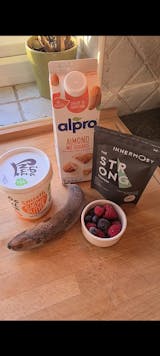If you didn’t know, World Vegan Day is coming up! And what better way to make a diet or lifestyle change than as a result of an annual event dedicated to the cause, right?
If you’re thinking about making some easy vegan swaps this World Vegan Day (or alternatively, this World Vegan Month), great! You’re in the right place. We’re here to answer all your burning questions starting with “when is World Vegan Day?” all the way through to “what are Innermost’s favourite vegan swaps?”
Here at Innermost, we’re big believers in the benefits of veganism. So much so, in fact, that we created our very own award-winning vegan protein: The Health Protein. But that’s not the only swap you can make…
Let’s get started.
When is World Vegan Day?
November 1st marks World Vegan Day, and the beginning of World Vegan Month. First commemorated back in 1994, World Vegan Day was created as a way to celebrate this lifestyle choice, bring awareness to veganism, and as a way to shout from the rooftops to those that don’t follow a vegan diet or lifestyle about the benefits and advantages of veganism.
Celebrated around the world, World Vegan Day is a hugely influential day and one that sees many thousands of people make the change to veganism, or swap one area of their lives to a more vegan lifestyle.
So, to inspire you to be another one of those people this World Vegan Day, we’ve put together five of our favourite easy vegan swaps to get you started, and get you prepped for the upcoming Veganuary, too.
Let’s get into these easy vegan swaps…
- Ditch leather for pleather
Now, we’re not suggesting you throw out any of your existing leather items, such as your favourite winter boots or that vintage leather jacket you love. In fact, that would actually be more of a waste and take you further away from a sustainable, vegan lifestyle.
A really easy swap to make in terms of future purchases, though, is by swapping your leather purchases for pleather. Pleather, artificial leather, faux leather or vegan leather, are all names that refer to a simple leather substitute, for those that want to achieve the look, feel or finish of leather garments or shoes, without using the actual leather animal by-product itself.
You can utilise artificial leather for upholstery, clothing or footwear, and this is a great way to adopt vegan choices into your life in a pretty easy way.
- Plant-based milk is the new dairy milk
We’re sure by now you’ve probably tried a milk alternative (and hopefully made the switch, if you’re able to), but if not, this World Vegan Day is the time to do it. There are plenty of dairy milk alternatives to choose from including oat milk, coconut milk, soy milk, almond milk or cashew milk (just to name a few, too) so go on, get out there and make the vegan swap!
If you’re not sure which milk to choose to best suit your diet, you can check out our handy guide to milk alternatives, too. We’ve got you… as always.
- Try out a vegan protein powder
Like we said, we’ve created some pretty great vegan friendly protein powders, so if you’re looking to make one easy vegan swap this World Vegan Day, why not switch whey for pea & brown rice, with The Health Protein or The Fit Protein, our two plant based blends.
Both available in Creamy Vanilla or Smooth Chocolate, they have been formulated with a perfectly balanced amino acid profile to help you build muscle and assist in muscle repair. This vegan swap is a no brainer if you ask us.
- Choose plant-based meat
Making the switch to plant-based meat is one of the biggest vegan food swaps you can make. Whilst it can be daunting at first, trying new things is exciting, and plant-based meat products brings a whole host of health benefits, including:
- Increased fibre in your diet
- Improved vitamin intake
- Reduces your saturated fat intake
- Reduces the risk of diabetes
If you’re going to make a vegan food swap that really makes a difference, the swap to plant-based meat is a big one. There are so many options, menus and even dedicated restaurants that create delicious meat-free creations that’ll make your mouth water and improve your carbon footprint, all at the same time.
According to a study by the University of Oxford has suggested that eating a vegan diet is one of the most impactful decisions to you can make when it comes to reducing your environmental impact, potentially reducing this impact by a whopping 73%. Can’t argue with that.
- Swap up your beauty products
Last but not least, when making an easy vegan swap, one of the first places to look for product swaps is your beauty or skincare routine. From your day-to-day moisturiser and SPF all the way to your shampoos and conditioners, look at your ingredients list to see if any of these contain any animal by-products.
A second step to take is to take to the internet and search the name of the brand or company you’re shopping from. Check to see if they’re marked as a brand that don’t test on animals or not. If they do, it’s time to throw that product to the kerb and shop around for something new.
Summary
Going plant-based and making some of these easy vegan swaps is not only good for you and your health, but the environment, too. If you need some extra tips, sign up to our Veganism email course. It’s a good one.
Finally, we only get one planet, and we’re all in this together, so this World Vegan Day, do your bit and make a change!
References
- The Independent. 2021. Going vegan is ‘single biggest way’ to reduce our impact, study finds. [online]. Click here.
























